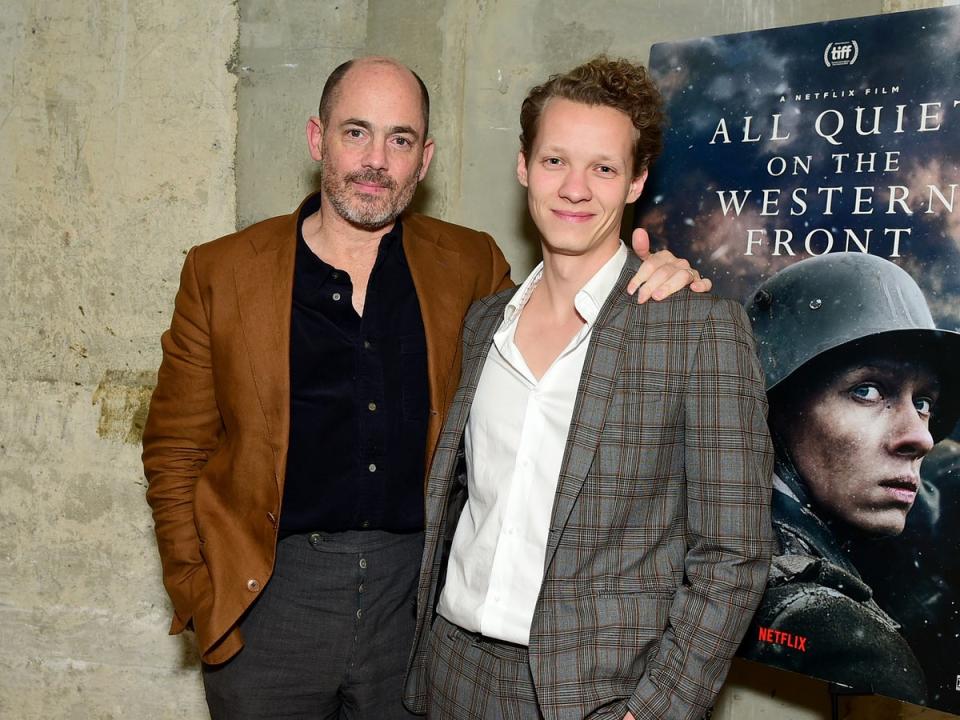No one noticed All Quiet on the Western Front. Now it’s Netflix’s best ever shot at the Oscars

- Oops!Something went wrong.Please try again later.
- Oops!Something went wrong.Please try again later.
- Oops!Something went wrong.Please try again later.
In an Oscar season defined by its surprises, from the bizarre, celebrity-led campaign to earn Andrea Riseborough a Best Actress nomination, to Normal People’s Paul Mescal getting a nod aged 26, the biggest has been the rise of a movie no one cared about a few months ago. Netflix’s All Quiet on the Western Front was released in October to little fanfare. It felt like one of those random original films to appear on a typical Friday morning with no real stars and (it seemed) few corporate expectations. Cut to today, though, and it swept the 2023 Bafta Awards – winning 6 of the 14 categories it was nominated for. At the Oscars, the film has been nominated in nine categories – second only to the 11 for Everything Everywhere All at Once.
All Quiet on the Western Front represents Netflix’s best chance of winning its first Best Picture Oscar since 2018’s Roma. It’s a prize the streamer covets deeply, having thrown everything at the wall in recent years: from humouring Martin Scorsese’s three-and-a-half-hour-long The Irishman to enlisting the help of critics’ favourites Adam Driver and Scarlett Johansson in Marriage Story. Just this year, millions of dollars were pumped into the marketing campaigns of movies you saw (such as Glass Onion: A Knives Out Mystery) and movies you definitely didn’t (White Noise, we hardly knew ye). Even those involved in All Quiet can’t quite believe what’s happened. “I really don’t really understand what’s going on at the moment,” Felix Kammerer, the movie’s baffled leading man, tells me over Zoom from his home in Vienna. “To see something that I hoped would work out fine now taking this path is just unbelievable.”
Based on Erich Maria Remarque’s famed 1928 anti-war novel of the same name, All Quiet on the Western Front follows Paul Bäumer (Kammerer), a young German soldier brimming with naivety. So eager to join his schoolmates in battle, he lies about receiving his parents’ consent, marching blindly into the hellscape of the Western Front. The events of the movie begin in 1917 when Germany is taking a battering from the Allies, who’ve been reinforced by swathes of American soldiers. The propaganda-driven illusion of an imminent German victory implodes almost instantly, and Paul is faced with the untold horrors of trench warfare.
The best-selling German novel of all time, the book has sold 20 million copies worldwide, despite the Nazis quickly banning the text. They, unsurprisingly, called it “anti-war propaganda” and burnt thousands of copies while they were at it, forcing Remarque to flee the country to save his life. “Huge pressure,” director Edward Berger tells me over Zoom about adapting the seminal text. Aside from him, most of that pressure fell on Kammerer, who had never worked on a film before. The 27-year-old theatre actor was discovered by All Quiet’s producer, who’d been convinced by his wife to see him act at the prestigious Burgtheater in Vienna. He offered him an audition on the spot. “He carries the movie like a heavy bag,” Berger says of his lead actor. “It’s a job you have to do and that’s the way Felix comports himself.”
Kammerer’s shattering performance as Paul is another reason why All Quiet was such a hit with critics. He has a singularly striking face – thin but bright, with huge eyes – that feels tailor-made for a war drama. It’s a fresh canvas for mud, blood and s*** from the battlefield. To prepare for the role he ran 10km with a weighted vest every day for six months. He also delved into the archives of the British Library, pouring over 2,500 letters written by soldiers from the front. He even watched interviews with murderers to try and grapple with the emotions that killing someone might invoke.
It’s also a huge production for an actor making his silver screen debut. The $20m (£16.6m) budget makes it one of the biggest movies to ever come out of Germany. “To stand in this 30-acre field with two and a half thousand extras... You suddenly feel what the movie is going to be,” Kammerer says. As a theatre veteran, the actor was unprepared to film scenes out of chronological order. He therefore devised a uniquely unglamorous strategy to help him keep track of Paul’s journey, one few actors would be prepared to reveal: an Excel spreadsheet.
Germans are always sceptical of ambition. Whenever you try something a little bit different than the norm, they get worried
Edward Berger
“It looks like a tax return form,” he says, smiling. He attempts to find a physical copy of the sheet, rifling through carefully organised scripts and scrapbooks, all of which are crammed with Post-It notes. In Kammerer’s spreadsheet, every moment in the film is divided into one of three categories, each tied to a singular emotion: “Fear of Death”, “Will to Kill”, “Pulse”. Only once in the film did all three categories reach their peak simultaneously, he says. It left such a mark on him that he even remembers its number: “Scene 95”. It sees Paul experiencing acute remorse after stabbing a French soldier. In vain, he attempts to save him. We watch in agony as the man slowly dies gracelessly in the mud, with Paul’s tears falling on him.
Academy voters will be all too aware that scenes such as this have taken on a new resonance due to the war in Ukraine, which coincided with the film’s release last year. “The pictures from Ukraine look exactly like pictures from the First World War,” Kammerer says. “It’s the same mud, the same trenches… And that’s absolutely devastating.”

The film was given a two-week run in select theatres before moving on to Netflix on 28 October, where it remained in the site’s Global Top 10 Films for 11 weeks. Its success is also a testament to English-speaking audiences’ growing receptiveness to non-English speaking media – Netflix’s Squid Game and Bong Joon-ho’s 2020 Best Picture winner Parasite being two obvious examples. “It doesn’t make any sense to make this movie in English,” Berger says. “It’s a German novel in the German language and it should be told by a group of German filmmakers in our language”.
Indeed, All Quiet has already been done in English, twice. Once in Lewis Milestone’s Best Picture-winning 1930 movie, and again by Delbert Mann as a television film in 1979, which won a Golden Globe. As a German, Berger says his “expertise” in the subject matter is the main reason he decided to remake the movie. “Germany, unfortunately, does have a background of starting two World Wars,” he says. “That’s something inherited. We can put this DNA into the movie.”
Despite staying mostly faithful to the text, Berger’s adaptation introduced new characters, omitted old ones and added new subplots. That’s largely why German critics were not quite as effusive as those abroad. Like several other national outlets, Munich-based broadsheet Süddeutsche Zeitung suggested that the book’s reputation had been abused to create “Oscar-bait”. “One-hundred and forty-eight minutes of blockbuster-compatible war kitsch is being slapped with a title that is internationally known and guarantees prestige and good sales. Maybe even an Oscar,” the newspaper’s film critic seethed. Berger has little time for such detractors. “Germans are always sceptical of ambition,” is his retort. “Whenever you try something a little bit different than the norm, they get worried.”

At the 95th Academy Awards on 12 March, All Quiet is in with a real shot to make history as Netflix’s first Best Picture winner. When I mention this possibility to Kammerer, a lurking Netflix publicist hastily reminds me that the service hasn’t been completely unsuccessful with Oscar so far: Roma won in three categories, including Best Director for Alfonso Cuarón. But their latest contender faces stiff competition from Everything Everywhere All at Once, Martin McDonagh’s The Banshees of Inisherin, and Steven Spielberg’s The Fabelmans. Whatever the outcome may be, Kammerer refuses to be drawn on his film’s chances: “I’m there to just be absolutely grateful and happy and astonished – what would you even do with nine Oscars, anyway?”
I’m sure Netflix could think of something.
‘All Quiet on the Western Front’ is streaming now on Netflix and can be watched at select cinemas

